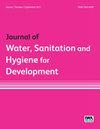Functioning of community sanitary complexes in rural India: Insights into selected states
IF 1.4
4区 环境科学与生态学
Q3 WATER RESOURCES
Journal of Water Sanitation and Hygiene for Development
Pub Date : 2023-06-01
DOI:10.2166/washdev.2023.066
引用次数: 0
Abstract
An important component of the Swachh Bharat Mission is the construction of community sanitary complexes (CSCs) to address the unmet need for sanitation for households. The success, however, critically hinges on the operational management of CSCs. We examine the functioning status of CSCs in rural areas of five Indian states. Furthermore, we study the association between alternative management arrangements with the functioning and maintenance status of the CSCs. A principal component analysis-based CSC functioning index is created based on the maintenance indicators and sanitary items to identify better-performing CSCs. The mixed-effects logistic regression analysis was applied to examine the association between management arrangement for maintenance and CSC functioning index. Four in every five CSCs were directly managed by the Gram Panchayat. Over 90% of the CSCs have running water supply but electricity connection and lighting arrangement were available in 66.1 and 55.1% CSCs, respectively. The econometric analysis finds that CSCs managed by worship area groups or those managed by village CSC user-groups have better CSC maintenance status. The cleaning frequency of the CSC has a significant association with CSC functioning status. The operational management of CSCs is an area for further policy attention for sustained community sanitation efforts.印度农村社区卫生综合体的运作:对选定州的见解
“清洁印度使命”的一个重要组成部分是建设社区卫生设施,以解决家庭卫生设施需求未得到满足的问题。然而,成功与否,关键取决于csc的运营管理。我们研究了印度五个邦农村地区CSCs的运作状况。此外,我们研究了替代管理安排与CSCs的功能和维护状态之间的关系。以维修指标和卫生项目为基础,建立了基于主成分分析的CSC功能指数,以识别性能较好的CSC。采用混合效应logistic回归分析检验维修管理安排与CSC功能指数的相关性。五分之四的社区服务中心由格兰村务委员会直接管理。超过90%的csc有自来水供应,但分别有66.1%和55.1%的csc有接驳电力和照明设施。计量分析发现,由礼拜区域群体管理的CSC和由村CSC用户群体管理的CSC维护状况较好。CSC的清洗频率与CSC的功能状态有显著的相关性。社区卫生服务中心的业务管理是一个需要政策进一步关注的领域,以促进持续的社区卫生工作。
本文章由计算机程序翻译,如有差异,请以英文原文为准。
求助全文
约1分钟内获得全文
求助全文
来源期刊

Journal of Water Sanitation and Hygiene for Development
WATER RESOURCES-
CiteScore
3.10
自引率
11.80%
发文量
58
审稿时长
16 weeks
期刊介绍:
The Journal of Water, Sanitation and Hygiene for Development is a peer-reviewed journal devoted to the dissemination of high-quality information on the science, policy and practice of drinking-water supply, sanitation and hygiene at local, national and international levels.
 求助内容:
求助内容: 应助结果提醒方式:
应助结果提醒方式:


